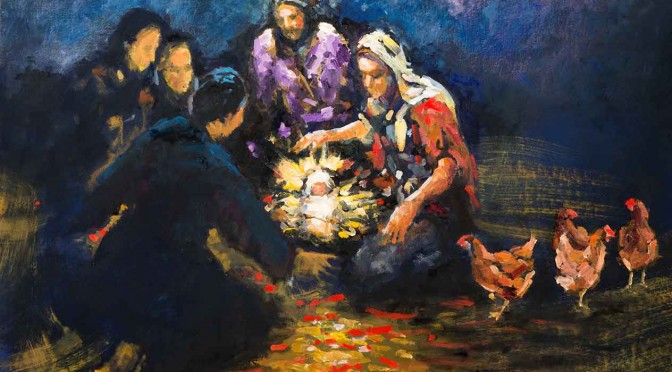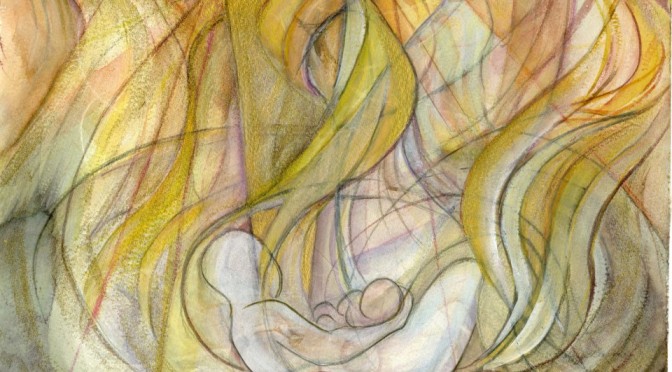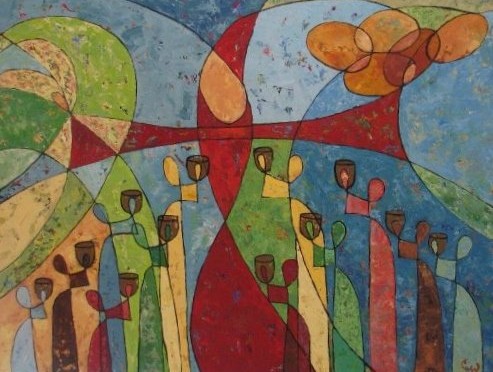Sermon Art: Creator of the Cosmos in a Manger by Hyatt Moore, oil on canvas, 2015. This is a cropped photo. See full painting here: Christ of the Cosmos – The Blank Canvas blog by Hyatt Moore — Oil painter
Caitlin Trussell with Augustana Lutheran Church on December 20, 2023, 6:15-7 p.m.
[sermon begins after two Bible readings]
John 1:1-5, 14 In the beginning was the Word, and the Word was with God, and the Word was God. 2He was in the beginning with God. 3All things came into being through him, and without him not one thing came into being. What has come into being 4in him was life, and the life was the light of all people. 5The light shines in the darkness, and the darkness did not overcome it.
14And the Word became flesh and lived among us, and we have seen his glory, the glory as of a father’s only son, full of grace and truth.
Luke 2:1-20 In those days a decree went out from Emperor Augustus that all the world should be registered. 2This was the first registration and was taken while Quirinius was governor of Syria. 3All went to their own towns to be registered. 4Joseph also went from the town of Nazareth in Galilee to Judea, to the city of David called Bethlehem, because he was descended from the house and family of David. 5He went to be registered with Mary, to whom he was engaged and who was expecting a child. 6While they were there, the time came for her to deliver her child. 7And she gave birth to her firstborn son and wrapped him in bands of cloth, and laid him in a manger, because there was no place for them in the inn.
8In that region there were shepherds living in the fields, keeping watch over their flock by night. 9Then an angel of the Lord stood before them, and the glory of the Lord shone around them, and they were terrified. 10But the angel said to them, “Do not be afraid; for see—I am bringing you good news of great joy for all the people: 11to you is born this day in the city of David a Savior, who is the Messiah, the Lord. 12This will be a sign for you: you will find a child wrapped in bands of cloth and lying in a manger.” 13And suddenly there was with the angel a multitude of the heavenly host, praising God and saying,
14“Glory to God in the highest heaven,
and on earth peace among those whom he favors!”
15When the angels had left them and gone into heaven, the shepherds said to one another, “Let us go now to Bethlehem and see this thing that has taken place, which the Lord has made known to us.” 16So they went with haste and found Mary and Joseph, and the child lying in the manger. 17When they saw this, they made known what had been told them about this child; 18and all who heard it were amazed at what the shepherds told them. 19But Mary treasured all these words and pondered them in her heart. 20The shepherds returned, glorifying and praising God for all they had heard and seen, as it had been told them.
[sermon begins]
At the manger-side, we’re drawn in a quieter way into the company of other people and the promises of God. Whether by temperament or circumstance we find ourselves in a reflective moment at a worship service. Christmas is a funny thing. It’s religious. It’s cultural. It’s festive. And it comes at just about the shortest day of the year, the winter solstice. There’s some history in those developments. The church long ago tried to figure out how to exist alongside earth-based, indigenous celebrations that were rowdy and a lot of fun. Time of year and some of the trimmings were combined from those celebrations and remain today. I’m cool with that. Christian faith has always lived in people’s lives while being translated by people’s lives.[1] This means that all kinds of things make their way into the mix.
There is also the story told in scripture. At Christmas, we celebrate a birth. Not just any birth…but a birth that shines light in the darkness, a birth that changes the world by way of love. God was active in history long before the birth of Jesus. Connecting the moment of his birth to God’s entire history, the gospel writer of John uses those powerful words, “In the beginning…”[2] These words that John uses to introduce the Word can also be heard in the very first verse of Genesis at the very beginning of the Bible.[3] This connection draws a huge arc through time, space, and place, between the birth of creation to the birth of Jesus – a spiritual genealogy of sorts.
While Luke spends time on the human story of shepherds and a manger, John spends time in the cosmos. Where Luke’s words are a quiet love story of a holy family, John’s words elevate us into poetic mystery. We could leave it there, in those mysterious heights. We could keep at a distance this mysterious poetry that many discard as heady and inaccessible. Except…except…John doesn’t leave it dangling out in the mystery of the cosmos, untouchable or inaccessible.
John brings the Word straight to the ground when he writes, “And the Word became flesh and lived among us.” This God who created…who made promises through Abraham, who brought freedom through Moses, who instigated challenge through the prophets, who gave guidance through kings…this God became flesh – vulnerable, beloved, tiny newborn flesh. A mysterious, inaccessible, cosmic God becomes a God that is part of our common humanity, through common flesh that pours out love to the whole world. God taking on flesh to join us in our humanity is the birth. Or, as John likes to put it, “And the Word became flesh and lived among us.”[4]
God living among us through the love of Jesus is cause for reflection. Not simply because God showed up but because God entered human fragility, surrendering cosmic power to reveal the depth of divine love. As John writes, “The light shines in the darkness and the darkness did not overcome it.” Light moving in the dark; day against night. This language may be poetic but we understand it by way of our experience.
The darkness of living with a mental illness that defies cure.
The darkness of grieving someone we love and the confusion it brings to daily life.
The darkness of disease, whether our own or someone we love, seems to take up more space than anything else.
The darkness of war in the world, killing fragile people to gain political power.
If we could sit and talk about the darkness, each one of us could name a way that it affects our lives or the life of someone we love. Into these real struggles, this darkness, Jesus is born. Jesus who continues to bring light that reveals God’s love in the midst of the worst that life brings – a light that shines a defiant hope.
We don’t have to go very far to find what’s broken. But think about how fast the speed of light travels to us, whether from the next room or from a star a million miles away. We don’t move a muscle and light comes. Just so, God comes down to us in a flash of light, fleshy and fragile, right to the heart of things. We don’t move a muscle and God shows up. In the company of other people this evening, we remind each other that this is God’s promise to us and to world. Some days that promise feels as fragile as candle flame. Tonight, the glimmer of light from the manger also feels like a defiant hope, a cosmic surrender revealing God’s love for broken world. No matter our feelings on any given day, “the light shines in the darkness and the darkness did not, [cannot, never will] overcome it.”
Amen and Merry Christmas!
__________________________________________
[1] “Syncretism” is the fancy word for weaving together traditions, including Christianity.
[2] John 1:1
[3] Genesis is the first book of the Bible’s 66 books. Genesis 1:1 – “In the beginning when God created the heavens and the earth…”
[4] John 1:14




![The Life of the Party [Proverbs 9:1-6, John 6:51-58]](https://caitlintrussell.org/wp-content/uploads/2018/08/Aretha-Franklin-2008-inauguration.sermon-caitlin-trussell-672x372.jpg)




